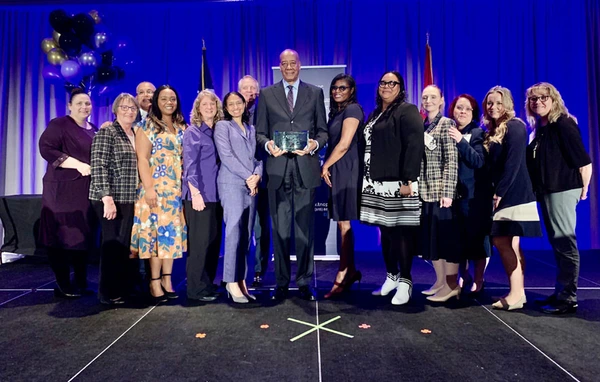At Nashville General Hospital (NGH), our mission is to improve the health and wellness of Nashville by providing equitable access to coordinated patient-centered care, supporting tomorrow’s caregivers, and translating science onto clinical practice. Our recent receipt of the 2021 TNCPE (Tennessee Center for Performance Excellence) Achievement Award is recognition that we are delivering on our mission.
Download this article as an illustrated PDF
The Achievement Award recognizes the NGH “commitment and practice of performance improvement principles outlined in the Baldrige Framework for Excellence, fact-based evaluation and improvement” and because we demonstrate “high performance levels in organizational results.” NGH is the only hospital in the Middle Tennessee region to be recognized with the 2021 TNCPE Achievement Award.
Adding Locations
In April of 2021, NGH broke ground for a second 7,000 square foot offsite clinic. This state-of-the-art facility in the Bordeaux area of North Nashville, had historically been considered a healthcare desert. The Nashville Healthcare Center will be the first full-service healthcare center in Bordeaux, bringing convenient access to a breadth of high-quality primary and specialty healthcare, lab and imaging services. Nashville Healthcare Center Bordeaux will open in the spring of this year.
Changing the NGH Revenue Model
NGH has been able to drive growth by developing a new business model focused on adding more revenue-generating services that could attract insured patients who might not previously have considered Nashville General for care. The goal was to change the hospital’s patient mix from primarily indigent to primarily insured so that we didn’t have to rely so heavily on public funding to help cover the more than $60 million in uncompensated care we provide each year.
The model has been a success. Today, 42% of NGH net revenues come from patients and 10% from the government, while just 43% comes from metro government funding. Another 5% comes from various other funding sources. NGH is now well positioned with a self-sustaining revenue model that enables us to continue our mission.
Improving Health Equity Through Health Literacy
At NGH, promoting health literacy is at the heart of how we approach population health. This is accomplished by leveraging the principles of evidence-based care management, which is the “systematic application of the best available evidence to management decision-making, aimed at improving the performance of healthcare organizations.” As part of this approach, we integrate the Patient Centered Medical Home model and the Patient-Centered Specialty Practice model into our chronic care model. This allows us to address health literacy through wholistic, proactive healthcare and well-care delivered to individuals where they live—in the community. Following are two programs that reflect our efforts.
Improving Health Equity Through Health Literacy
At NGH, promoting health literacy is at the heart of how we approach population health. This is accomplished by leveraging the principles of evidence-based care management, which is the “systematic application of the best available evidence to management decision-making, aimed at improving the performance of healthcare organizations.” As part of this approach, we integrate the Patient Centered Medical Home model and the Patient-Centered Specialty Practice model into our chronic care model. This allows us to address health literacy through wholistic, proactive healthcare and well-care delivered to individuals where they live—in the community. Following are two programs that reflect our efforts.
Food Pharmacy
Millions of individuals in our nation struggle with food insecurity, especially those living in economically disadvantage neighborhoods where healthy food if often not available. This leads to a lifetime of unhealthy food choices that contribute to chronic conditions. That’s why every patient that comes into contact with our hospital—whether through the emergency department or ambulatory division—receives a food insecurity assessment. If the results are positive, the provider writes a prescription that allows the patient to receive food from our food pharmacy. It is an actual prescription that goes into the individual’s electronic health record.
CHEN.
Nashville General also addresses health literacy through the Congregational Health and Education Network or CHEN, is a growing faith-based network that currently consists of 110 congregations. We know that certain populations rely heavily on faith-based organizations. Now a 501(c)(3) organization, CHEN’s goal is to reduce health disparities by addressing social determinants of health.
One of the most impactful social determinant is educational attainment, which aligns closely with health literacy. We know that incremental improvements in education attainment delivers exponential improvements in all the other social determinants. NGH works with individuals through health sciences programs at not only our hospital, but also at local colleges and universities to advance educational attainment.
We’ve also created a workforce development component through a partnership with one of our local healthcare systems, offering programs for radiology technicians, nursing assistants, and EEG technicians. These are great starting points where young people coming out of high school can be making a decent wage after just two years in one of these programs. This is a great way to help mitigate social determinants and change the trajectory of our most vulnerable populations.
A Century of Care
For more than a century, Nashville General Hospital has been serving the community as a steadfast beacon of care and compassion — making outstanding, comprehensive healthcare accessible to all. Here, all are welcomed, and all are
